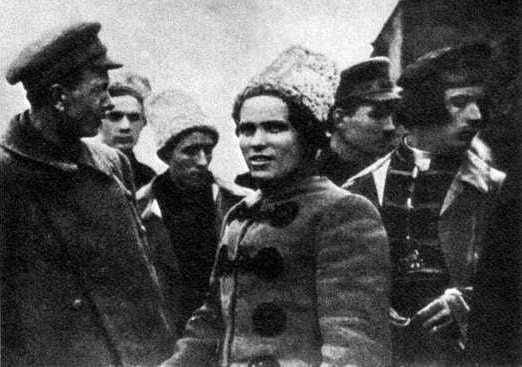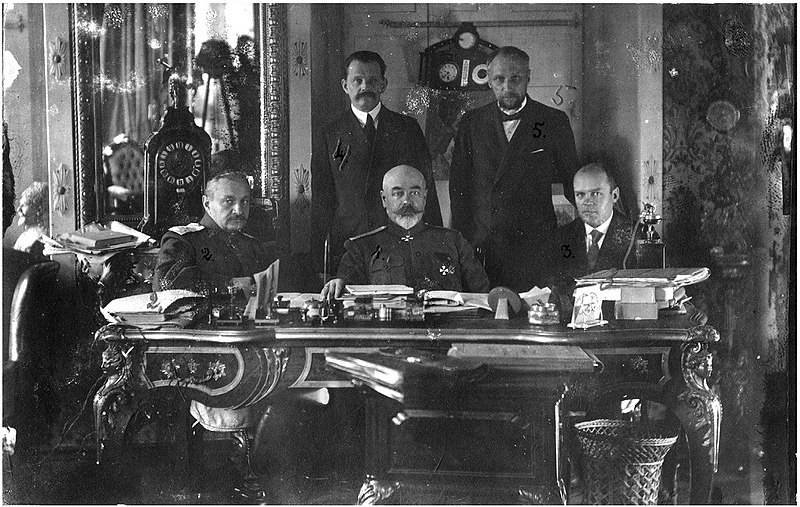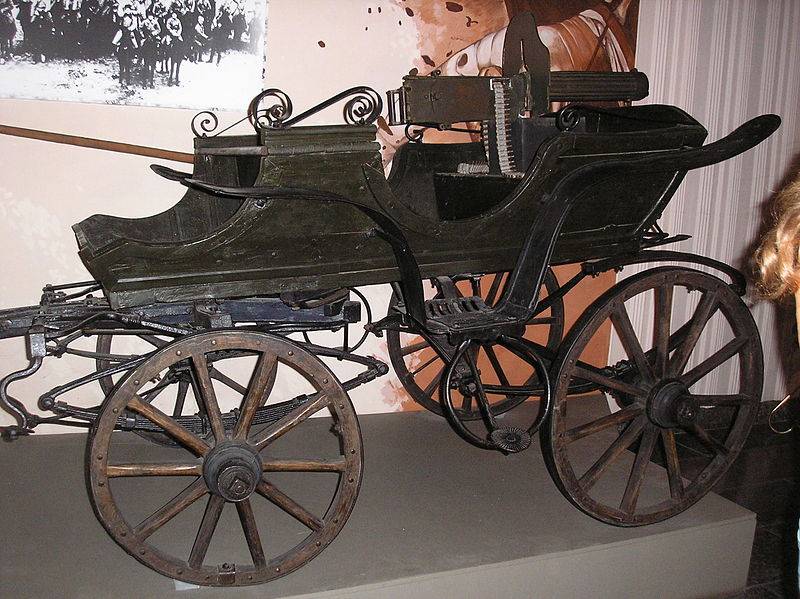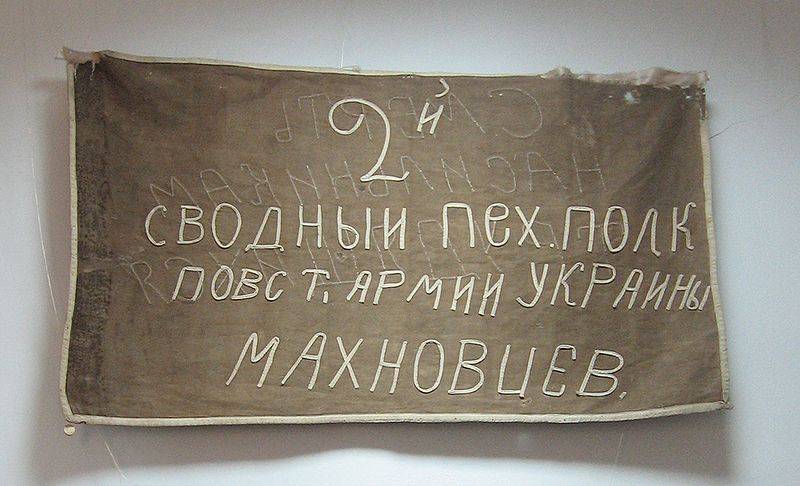Makhno's blow to Denikin

Smoot. 1919 year. The Makhno guerrilla war to destroy the rear of the White Army had a noticeable impact on the course of the war and helped the Red Army repel Denikin’s troops offensive against Moscow.
People and White Power
As previously noted ("Why did the White Army lose"), the fundamental reason for the defeat of the White movement was the "white project" itself - bourgeois-liberal, pro-Western. The Westernist feudalists, having curtailed Tsar Nicholas II, destroyed the autocracy and empire, created the Provisional Republican Government, tried to make Russia a part of the "civilized world", Europe. However, their actions became a troubles detonator. The whites lost power. To return it, they, with the participation of Western "partners", unleashed a civil war. Their victory signified the dominance of capitalism and the bourgeois-liberal order. This was contrary to the deep interests of Russian civilization and the people.
All other causes, contradictions, and problems that led to the defeat of White came from here. Robberies and requisitions were common for all warriors, causing hatred of the population, reducing the social base of the White movement. Especially robberies were characteristic of Cossacks and mountain units. The Donets of Mamontov, having carried out a successful raid on the rear of the Southern Front in August - September 1919, returned with huge convoys and loaded with various goods. Then most of the Cossacks went home to take away their prey and celebrate. The chairman of the Tersky circle Gubarev, who himself fought, reported: “Of course, you should not send uniforms. They’ve changed ten times already. A Cossack returns from a campaign loaded so that he and a horse cannot be seen. And the next day he goes camping again in one torn Circassian. ” Some commanders looked at such disgraces by closing their eyes. In particular, when Yekaterinoslav was captured, the Cossacks Shkuro and Irmanov walked around the city well.
There were objective factors for the robberies - poor supply, lack of a developed and permanent rear, a normally functioning monetary system. Troops often "fed" from the population, as in the Middle Ages, switched to "self-supply". Entire echelons or convoys followed the troops, which the regiments loaded with “their” property, good. In reserve. The hope of getting something from the rear was weak. Denikins were unable to organize a normal monetary system, as a result, the troops did not receive a salary for two to three months. Therefore, instead of buying the necessary products, the White Guards often resorted to requisition or outright robbery. Moreover, the war raised criminal, dark elements from the social bottom. They were in the White and Red armies. It is clear that the white command tried to deal with these phenomena, which very quickly turned the regular units into gangs. Harsh laws and relevant orders were issued at all levels. Crimes were investigated by emergency commissions. However, to stop this evil in the chaos of unrest failed.
The rear Denikin administration was weak. There were no cadres, usually not the best people went to the local administration, those who wanted to avoid the front line, or were unsuitable for military service. Appointed and officers, but usually from the old, crippled, left without a post. For them, civilian administration was new, had to delve into, or rely on assistants. There were many loafers, dark personalities, speculators, businessmen who used the troubles for personal gain. As a result, the Denikin administration was not able to solve the problem of establishing law and order in the rear.
The Denikin government was not able to solve the land issue, to carry out agrarian reform. Agricultural laws were developed: they planned to strengthen small and medium-sized enterprises at the expense of state and landowner lands. In each locality, they were going to introduce the maximum of the land that remained in the hands of the previous owner, the surplus was transferred to low-land. However, the Kolchak government, which was subordinate to the Special Meeting under the Supreme Commander of the All-Union Socialist League, (advisory body in the field of legislation and the supreme administration under the commander-in-chief of the Volunteer Army), postponed the solution of this issue. The temporary Kolchak law entered into force, which prescribed until the Constituent Assembly to preserve land ownership of the previous owners. This led to the fact that the previous owners, returning to the territory occupied by the whites, began to demand the return of land, livestock, equipment, and compensation for losses. It was not until the fall of 1919 that a special meeting returned to this question, but did not succeed in bringing the matter to an end. The issue of land ownership and, in general, property rights was a key issue for the owners of the White movement. It is clear that this also did not add popularity to the White Guards among the broad masses. The peasants have already de facto resolved the land issue in their favor.
As a result, the Bolsheviks quite easily won the information war against the White movement. Even realizing the mighty power of such weaponsas propaganda, the White Guards failed to use it properly. The Bolsheviks massively and professionally processed not only their rear and front, but also the white rear. In Siberia, in the south of Russia, in the Russian North, mass uprisings were everywhere in the rear of the whites. At the same time, in Central Russia, while the struggle with the White Army was ongoing, it was relatively quiet. Peasants deserted in droves from the Red Army, and rebelled against the Bolsheviks, but they hated whites more. It was historical memory. With the White Guards, the "master" went to the peasants, who had traditionally been hated since serfdom, whose estate was burned back in 1917, after February, when the peasant war began. Lands, cattle and other good were divided or destroyed. With the "master" came the "Cossack nagayshchiki" - a scarecrow for the peasants, at all times pacifying peasant riots, stealing entire villages.
Thus, Denikinites had to fight not only against the Red Army, but entire armies in the rear. Denikin had to hold troops to keep the North Caucasus, to fight with the highlanders, the army of the emir Uzun-Khadzhi, various “green” bandits, atamans and fathers, Petliurists and Makhnovists, who had popular support in New Russia and Little Russia. The forces of the Red Army had to be distributed on different fronts and directions.

City and Village War
All over Russia, there was a war not only of white and red, but also of a clash of power (any power) with the Russian village. Today, many do not know that at that time Russia was a peasant country. The endless peasant sea and the islands of urban civilization. 85% of the inhabitants of the empire are villagers. Moreover, many workers were children of peasants, or just came from the village (first-generation workers). February of the 1917 of the year led to a terrible disaster - the state collapsed. The last state bonds, the autocracy and the army, were destroyed. The chatter of liberal temporary workers, "democracy" and "freedom" as they understood it meant nothing to the peasants.
The village made a decision: enough to endure power on its neck. From now on, peasants did not want to serve in the army, pay taxes, comply with laws adopted in cities, pay exorbitant prices for manufactured goods and give bread for nothing. The peasant world opposed generally any government and state. Everywhere, peasants divided the state and landowner lands, created self-defense units, fought first with one power, then with another. Partisan peasants at first fought fiercely with the whites, and then, when the Reds defeated, they also opposed the Soviet regime.
Both white and red forced the peasants to supply their cities and armies with food. They acted in the same way: they introduced a food reconnaissance, formed food detachments (specially detached parts of the whites), they took away bread, livestock, etc. With this, industry in the country stood up. The city, as before in peacetime, could not give the village manufactured goods in exchange for provisions. I had to take it by force, until the Bolsheviks could not win and, at the very least, but launched the industry. This caused the most fierce resistance of the village. In turn, whites destroyed entire villages, declaring them to be “gangster’s nests”, and shot hostages - relatives of “gangsters”. In Kolchak Siberia, troops acted against the people as the most cruel enemy: mass executions, executions, burning of rebellious villages, confiscation and indemnity. The Reds also acted when they crushed the peasant freemen (like Antonov-Ovseenko and Tukhachevsky in the Tambov region) with the most merciless. True, unlike the whites, the Reds acted with great success and yet were able to suppress the peasant element, which, if it was defeated, could kill Russian civilization and the people.
The project of free cultivators
The peasant world put forward its project for the future of Russia - the world of freemen, free farmers. The village opposed any government and state. This was the response of the people to the Westernization of Russia by the Romanovs, which went against the people and, for the most part, at their expense. When the autocracy collapsed, the village immediately began its war. And after October, when the two authorities, white and red, met in a fierce battle between themselves, the village did everything to completely destroy the state and establish a new life in conditions of complete disintegration.
The Russian peasantry put forward their unique project of the future - the utopian ideal of life for free cultivators, peasant communities. Peasants received land in the ownership and cultivated it on the basis of a neighboring community. The peasants paid a terrible price for this utopia. The peasant war and its suppression became, apparently, the most terrible page of the Russian Troubles. However, if the village could gain up, then this clearly led to the death of civilization and people. In the industrial XX century. the peasant world with guns and carts would not have survived the armies of industrialized countries with tanks, airplanes and artillery. Russia would be a victim of neighboring predators - Japan, Poland, Finland, England, the USA, etc.
War Makhno
The rich Little Russian peasantry, which was already accustomed to “free will”, did not need power. Therefore, almost immediately after the defeat of the Reds in Little Russia and New Russia, and the establishment of Denikin’s power, a new wave of peasant war began there. It began from the time of February, the Central Council, and continued during the Austro-German occupation, the Hetman, Petliura and the Soviets. One of the brightest leaders that peasant Russia gave the world was Nestor Ivanovich Makhno.
Makhno, after breaking up with the Bolsheviks and a summer defeat from the whites, led his partisan detachments west and towards the beginning of September 1919 approached Uman. Then he entered into a temporary alliance with the Petliurists and occupied the front against the whites. Petlyura provided territory for basing and recreation, space for the sick and wounded, and ammunition supply. Makhno recovered from defeat, his troops rested, replenished ranks due to fleeing from the White Red Army. Petliurites began to actively move to the dad, dissatisfied with the attempts of the Petliura command to restore at least some order (Makhno had a partisan freemen). Also, the Makhnovists successfully plundered numerous wagons of the defeated Southern Red Group (in the Odessa region), Soviet institutions and refugees, which ran parallel to the front from south to north. So the Makhnovists significantly replenished their reserves, seized a large number of horses and wagons. Thus, they secured further operations, got mobility.
Particularly increased the role of the main striking force - carts. This is a horse-drawn spring wagon with an easel machine gun aimed back in the direction of travel. 2-4 horses were harnessed to the cart, the crew - 2-3 people (driver, machine gunner and his assistant). The cart was used both for transporting infantry and in battle. At the same time, the overall speed of the detachment corresponded to the speed of cavalry marching at lynxes. Makhno units easily passed up to 100 km per day for several days in a row. Most often, carts were used to transport infantry and machine guns with calculation and ammunition. When approaching the battlefield, the crew removed the machine gun from the wagon and put it in position. Shooting directly from the cart was provided in exceptional cases, since in this case horses fell under enemy fire.
With Petliura, Makhno was out of the way. The old man did not support the idea of "independent Ukraine". It was not possible to seize control over the Petliurites. In addition, the pressure of the White Guards increased, which threatened with a final defeat. The Makhnovists could not stand the frontal battle with the white. Makhno decided to break into his native places. On 12 (25) on September 1919, he unexpectedly raised his troops and went on a breakthrough, east, on the whites, who were located by the main forces under the village of Peregonovka. Two regiments of General Slashchev, not expecting an attack, were defeated, and the Makhnovists moved to the Dnieper. The rebels moved very quickly, the infantry was planted on carts and carts, tired horses were exchanged for fresh from the peasants.

The successes of the Makhnovists and the counterattack of Denikin’s
On 22 of September (5 of October), the Makhnovists were at the Dnieper, and having shot down the weak screens of whites, hastily put forward for the defense of the crossings, forced the river. Makhno returned to the Left-Bank Little Russia, took Alexandrovsk (Zaporozhye) and on September 24 (October 7) was in Gulyai-Pole, having overcome about 11 versts in 600 days. Soon Makhnovism spread over a vast territory. Denikin noted in his memoirs: “in early October, the rebels were in the hands of the rebels, Melitopol, Berdyansk, where they blew up artillery depots, and Mariupol - in 100 versts from Stavka (Taganrog). The rebels approached Sinelnikovo and threatened Volnovakha - our artillery base ... Random units — local garrisons, reserve battalions, and State Guard detachments, initially set up against Makhno, were easily defeated by his large gangs. The situation was becoming formidable and required exceptional measures. To suppress the uprising, it was necessary, despite the serious position of the front, to remove parts from it and use all the reserves. ... This rebellion, which took on such a wide scale, upset our rear and weakened the front in the most difficult time for him. ”
Under the leadership of Makhno there was a whole army - 40 — 50 thousand people. Her numbers constantly fluctuated, depending on current operations, victories or failures. In almost every village there were units that were subordinate to the headquarters of Makhno or acted independently, but on his behalf. They gathered in larger detachments, disintegrated, reunited. The core of the Makhnovist army consisted of approximately 5 thousand soldiers. These were desperate thugs who lived one day, a rampant freemen and adventurers, anarchists, former sailors and deserters from various armies, outright bandits. They often took turns - they died in battles, from illnesses, drank too much, but in their place there were new lovers of “free” life. Peasant regiments were also formed, the number of which reached up to 10 — 15 thousand people during major operations. In secret warehouses and caches in the villages hid a lot of weapons, up to cannons and machine guns, ammunition. If necessary, significant forces could be immediately raised and armed. Moreover, the peasants themselves considered themselves to be true Makhnovists, despised the "cadre" bandits, and on occasion destroyed them like mad dogs. But the authority of the father was iron.
White could not resist such a powerful uprising, the whole army, which was supported by the entire local peasantry. All the main forces were at the front against the Reds. The White Guard garrisons in the cities were extremely small, with several platoons or companies. Plus spare battalions. The state guard (police) has just begun to take shape and was small. All of these units were easily crushed by the large gangs of Makhno. Therefore, in a short time Makhnovists captured a large area. Artillery depots were located in Berdyansk, so the garrison was strong. However, the Makhnovists organized an uprising, the rebels hit the whites from the rear. Denikinites were defeated. The rebels blew up warehouses.
When taking cities, a very distinct picture of the general war of the city and the village was drawn. Behind the rebels hundreds, thousands of local peasants rushed into cities on carts. They exported everything that they could carry from shops, institutions and houses, weapons, ammunition, equipment. They mobilized the mobilized peasants, plundered and burned state institutions, army depots. Caught officers and officials were killed.
Thus, literally in 2-3 weeks, the Makhnovists crushed the rear of Denikin’s army in New Russia. The local administration was killed or fled, economic and civilian life was destroyed. Soon, the Makhnovists took Mariupol, threatened Taganrog, where there was a headquarters of Denikin, Sinelnikov and Volnovakha. Despite the extremely difficult battles with the Red Army, the white command had to urgently withdraw troops from the front and transfer them to the rear. A group of General Revishin was formed in the Volnovakhi area: Terskaya and Chechenskaya horse divisions, horse brigade, 3 infantry regiment and 3 reserve battalion. 26 October 1919 g. White went on the offensive. At the same time, from the south of the Schilling group, Denikin turned against Makhno the corps of Slashchev (13 and 34 divisions), which they had previously planned to send to the Moscow direction. Slashchev acted from the west, from Znamenka, and from the south, from Nikolaev, suppressing the uprising on the right bank of the Dnieper.
Fierce fighting went on for a month. At first, Makhno stubbornly clung to the line Berdyansk - Gulyai-Pole - Sinelnikovo. The Makhnovists tried to keep the blow, but the White Guards pressed them to the Dnieper. Finally, their front collapsed under the blows of a white cavalry, many prominent assistants and commanders of Makhno died. Ordinary fighters scattered in the villages. Pushed to the Dnieper, the rebels tried to retreat through the Nikopol and Kichkass crossings. But here were already parts of Slashchev who came from the west. Many Makhnovists died. But the dad himself with the core of the army again left. He crossed to the right bank of the Dnieper in advance, as soon as the troops of Revishin launched an offensive. And suddenly attacked Yekaterinoslav. In the city itself, the Makhnovists, disguised as peasants traveling to the bazaar, raised a stir. White fled across the railway bridge across the Dnieper. Makhno blew up the bridge and prepared for the defense of the provincial city.
By the end of November 1919, the Revishin and Slashchev groups had cleared the lower reaches of the Dnieper from the rebels. December 8 Slaschev went on the assault of Yekaterinoslav. Makhno did not become heroes and broke through the highway to Nikopol. But as soon as white occupied the city, when the Makhnovists suddenly returned and attacked the city. With an unexpected blow, the rebels captured the railway station, where the headquarters of the 3 Army Corps was located. The situation was critical. Slashchev showed courage and determination, personally led his convoy with hostility and discarded the enemy. The attack was repelled and the Makhnovists again retreated. However, the winners were besieged. The Makhnovists tried twice more to take the city, but they were thrown back. Then Makhno turned to the usual partisan tactics: raids of small parties in one place or another, actions on communications, with strong pressure, the Makhnovist detachments immediately scattered and “disappeared”. Slashchev himself had a rich school of maneuver warfare, in the Shkuro detachment, in the Crimea, but even he could not defeat the peasant leader. He borrowed a lot from the Makhnovists, in particular, the carts.
Thus, with great difficulty and diverting forces from the main front, White was able to temporarily put out the fire of Makhnovism. The main rebellion was crushed, but the struggle with Makhno continued and took on a protracted character.

- Alexander Samsonov
- Smoot. 1919 year
How the British created the Armed Forces of the South of Russia
How to restore Soviet power in Ukraine
How Petliurists led Little Russia to a complete catastrophe
How defeated Petliurism
Give the boundaries of 1772 of the year!
Battle for the North Caucasus. How to suppress the Terek Uprising
Battle for the North Caucasus. CH 2. December battle
Battle for the North Caucasus. CH 3. The January accident of the 11 Army
Battle for the North Caucasus. CH 4. How the 11 army died
Battle for the North Caucasus. CH 5. Capture of Kizlyar and the Terrible
Battle for the North Caucasus. CH 6. Furious assault of Vladikavkaz
How Georgia tried to seize Sochi
How the Whites crushed the Georgian invaders
The war of February and October as a confrontation between two civilization projects
How did the "Flight to the Volga"
How Kolchak's army broke through to the Volga
Catastrophe of the Don Cossacks
Verkhniyon uprising
How "Great Finland" planned to seize Petrograd
"All to fight with Kolchak!"
Frunze. Red Napoleon
The missed opportunities of the army of Kolchak
May offensive of the Northern Corps
How white broke through to Petrograd
Battle for the South of Russia
Strategic change on the southern front. Manych operation
Crimea on fire Russian distemper
Crimea in 1918-1919. Intervents, local authorities and whites
How did the uprising of ataman Grigoriev
Nikifor Grigoriev, "ataman of the rebel forces of Kherson region, Zaporizhia and Tavria"
Odessa operation ataman Grigoriev
Uprising in the Ukraine. How failed the “Blitzkrieg” of Grigorievka
Ufa operation. How were defeated the best parts of the army of Kolchak
Moscow campaign army Denikin
"All to fight with Denikin!"
Battle of the Urals
The defeat of the Siberian army. How the Red Army liberated Perm and Yekaterinburg
The defeat of Kolchak in the Chelyabinsk battle
August Counterattack of the Southern Front
The battle for Siberia. Recent operations Kolchak
Pyrrhic victory of the Kolchak armies on Tobol
Operation "White Sword". Beat at the heart of the revolution
"Do not give up Petrograd!"
General battle for Russia
Avalov Army Campaign in Riga
The defeat of the Kolchak armies in the second battle on Tobol
Victories of Denikin’s army in New Russia and Little Russia
White Movement Top
Recent major victories of Denikin
Why did the White Army lose?
Information